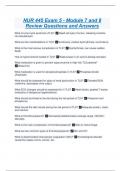NUR 445 Exam 5 - Module 7 and 8
Review Questions and Answers
What is tumor lysis syndrome (TLS)? ✅Rapid cell lysis of tumor, releasing contents
into bloodstream.
What are the manifestations of TLS? ✅Numbness, cardiac dysrhythmias, renal failure.
What is the most serious complication of TLS? ✅Dysrhythmias, can cause sudden
death.
How is hyperuricemia treated in TLS? ✅Rasburicase if uric acid is already elevated.
What medication is given to prevent hyperuricemia in high-risk TLS patients?
✅Allopurinol.
What medication is used for elevated phosphate in TLS? ✅Phosphate binder
(Amphojel).
What should be assessed for signs of renal dysfunction in TLS? ✅Elevated BUN,
creatinine, decreased urine output.
What ECG changes should be assessed for in TLS? ✅Heart blocks, peaked T waves
(indicative of dangerous hyperkalemia).
What should be limited in the diet during the risk period of TLS? ✅Potassium and
phosphorus.
What should the diet include during the risk period of TLS? ✅Adequate protein, carbs,
and calories.
What is thrombocytopenia? ✅Decreased platelets below average range (150,000 -
450,000).
What is the main complication of thrombocytopenia? ✅Risk for hemorrhage.
What are two common types of thrombocytopenia? ✅DIC and HIT.
What is disseminated intravascular coagulation (DIC)? ✅Hematological disorder
caused by sepsis, burns, cancer, etc.
,What do patients with DIC present with? ✅Both thrombotic and bleeding problems.
What causes abnormal coagulation in DIC? ✅Formation of multiple small clots that
consume clotting factors and fibrinogen.
What are the two phases of DIC? ✅Thrombotic/clotting phase.
What is the bleeding phase? ✅Excessive bleeding due to inability to form clots.
What is the medical management for excessive bleeding? ✅Treatment of underlying
disorder and other disorders.
What are the manifestations of excessive bleeding? ✅Nose bleeds, bleeding at IV site,
gum bleeding, SOB, hypotension, hypoxia, bruising, blood clots, fever, metabolic
acidosis.
How is excessive bleeding treated? ✅Treat the underlying cause, replace clotting
factors, volume replacement, crystalloid solutions, anticoagulant therapy.
What are the bleeding precautions? ✅Avoid rectal thermometer, sex, nose blows, use
soft toothbrush, electric razor, and stool softeners.
What medications are contraindicated due to increased bleeding risk? ✅NSAIDs.
What is HIT? ✅Heparin induced thrombocytopenia - autoimmune allergic response to
heparin.
What are the signs and symptoms of HIT? ✅Petechiae, ecchymosis, nosebleeds,
bleeding gums, black tarry stool, hematuria, decreased platelets.
How is HIT treated? ✅Stop heparin administration, use argatroban and lepirudin as
anticoagulants, protamine sulfate as heparin antidote, warfarin is contraindicated.
What is liver disease? ✅Disease affecting the liver.
What is liver trauma? ✅Liver injury often caused by motor vehicle accidents.
What are the symptoms of hepatic insufficiency? ✅Jaundice, increased bilirubin,
increased serum transaminase.
What supplements should be taken for liver disease? ✅Iron and vitamin supplements.
What are the labs indicating liver failure? ✅Increase liver enzymes (ALT, AST),
Increased bilirubin, Increase serum ammonia, Decreased albumin
, What are the risk factors for hepatitis? ✅Risky behaviors (sharing needles,
unprotected sex with multiple partners), Recent travel overseas, Alcohol abuse,
Exposure to some hepatotoxic medications, toxins or autoimmune disease
What is the pathophysiology of hepatitis? ✅Inflammation of liver cells due to virus,
Impairs ability to detox, limits protein production and clotting factors, alters ability to
store vitamins, fats and sugars
What are the clinical manifestations of hepatitis? ✅Increased liver enzymes (ALT,
AST), Increased bilirubin (total and direct), Increased serum ammonia, Decreased
albumin, Jaundice, Abdominal pain
How is hepatitis diagnosed? ✅Recent travel outside U.S
What medications are used for hepatitis? ✅Vaccination for Hepatitis A and B
What is the most common reason for liver transplantation in hepatitis C-related
cirrhosis? ✅Hepatitis C-related cirrhosis
What are the major complications after liver transplant? ✅Organ rejection and infection
What assessments are done for liver transplant patients? ✅Increased liver enzymes
(ALT and AST), Signs of organ rejection (RUQ pain, changes in bile drainage, fever,
tachycardia, jaundice)
What nursing actions should be taken for hepatitis patients? ✅Refer patient to social
worker for assistance with medication financing
What should be included in the teaching for hepatitis patients? ✅Nutritional teaching
(balanced diet, decreased fat and protein), Good hand hygiene to decrease
transmission from fecal-oral route, Avoid behaviors that contribute to transmission
(needle sharing, unprotected sex), Importance of vaccinations to prevent hepatitis A and
B, Safe public water supply and sewage disposal to prevent hep A
What are the risk factors for cirrhosis? ✅Chronic infection with Hep A, B or C, Chronic
alcoholism
What is the pathophysiology of cirrhosis? ✅Irreversible chronic cell destruction and
fibrosis/scarring of the hepatic tissue
What is ascites? ✅Accumulation of protein-rich fluid in the abdominal cavity.




